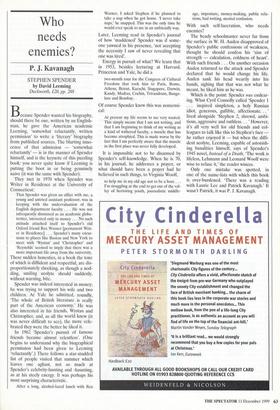Who needs enemies?
P. J. Kavanagh
STEPHEN SPENDER by David Leeming
Duckworth, £20, pp. 288
Because Spender wanted his biography, should there be one, written by an English- man, he gave the American academic Leeming, 'somewhat reluctantly, written permission' to write a 'literary' biography from published sources. The blurting inno- cence of that admission — 'somewhat reluctantly' — is in the manner of Spender himself, and is the keynote of this puzzling book: you never quite know if Leeming is putting the boot in or being genuinely naive (it was the same with Spender).
They met in 1970 when Spender was Writer in Residence at the University of Connecticut:
That Spender was given an office with me, a young and untried assistant professor, was in keeping with the undervaluation of the English department faculty . . . He was not infrequently dismissed as an academic globe- trotter, interested only in money ... No such attitude attached itself to Spender's old Oxford friend Rex Warner [permanent Writ- er in Residence] ... Spender's many excur- sions to places like Boston and New York to meet with 'Wystan' and 'Christopher' and 'Reynolds' seemed to imply that there was a more important life away from the university.
These sudden honesties, in a book the tone of which is diffident and respectful, are dis- proportionately shocking, as though a nod- ding, smiling acolyte should suddenly, without warning, bite.
Spender was indeed interested in money; he was trying to support his wife and two children. At Yale he admitted, roundly, 'The whole of British literature is really part of the American economy.' He was also interested in his friends, Wystan and Christopher, and, as all the world knew (it was never difficult to see), the more cele- brated they were the better he liked it.
In 1962 'Spender's pursuit of famous friends became almost relentless'. (One begins to understand why the biographical permission had been given to Leeming 'reluctantly'.) There follows a star-studded list of people visited that summer which leaves one aghast, not so much at Spender's celebrity-hunting and -haunting, as at his steely energy. It was perhaps his most surprising characteristic.
After a long, alcohol-laced lunch with Rex Warner, I asked Stephen if he planned to take a nap when he got home. 'I never take naps,' he snapped. This was the only time he would ever speak to me in an unfriendly way.
Later, Leeming read in Spender's journal of how 'maddened' Spender was if some one yawned in his presence, 'not accepting the necessity I saw of never revealing that one was tired'.
Energy in pursuit of what? We learn that in 1953, besides lecturing at Harvard, Princeton and Yale, he did a
two-month tour for the Congress of Cultural Freedom that took him to Paris, Rome, Athens, Beirut, Karachi, Singapore, Darwin, Kandy, Madras, Cochin, Trivandrum, Banga- lore and Bombay.
Of course Spender knew this was nonsensi- cal:
At present my life seems to me very wasted. This simply means that I am not writing, and that I am beginning to think of my writing as a kind of withered faculty, a muscle that has become atrophied. This is made worse by the fact that I am perfectly aware that the muscle in the first place was never fully developed.
It is impossible not to be disarmed by Spender's self-knowledge. When he is 70, in his journal, he addresses a prayer, or what should have been a prayer had he believed in such things, to Virginia Woolf,
to help me in my old age not to be a bore ... I'm struggling at the end to get out of the val- ley of hectoring youth, journalistic middle- age, imposture, money-making, public rela- tions, bad writing, mental confusion.
With such self-laceration, who needs enemies?
The beady schoolmaster never far from the surface in W. H. Auden disapproved of Spender's public confessions of weakness, thought he should confess his 'sins of strength — calculation, coldness of heart'. With such friends . On another occasion Auden returned to the attack and Spender declared that he would change his life. Auden sank his head wearily into his hands, sighing that that was not what he meant, he liked him as he was,
Which is the point: Spender was endear- ing. What Cyril Connolly called 'Spender 1 ... inspired simpleton, a holy Russian idiot, generous, gullible, affectionate, ' lived alongside 'Stephen 2, shrewd, ambi- tious, aggressive and ruthless... ' However, it's all very well for old friends and col- leagues to talk like this to Stephen's face he rather enjoyed it — but when the diffi- dent acolyte, Leeming, capable of astonish- ing banalities himself, says of Spender's 1945 novel, Instead of a Death, 'The work is lifeless, Lehmann and Leonard Woolf were wise to refuse it,' the reader winces.
Only one mistake was spotted, in one of the name-lists with which this book is over-burdened. 'There was a reading with Laurie Lee and Patrick Kavanagh.' It wasn't Patrick, it was P. J. Kavanagh.


























































































 Previous page
Previous page